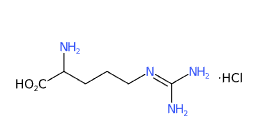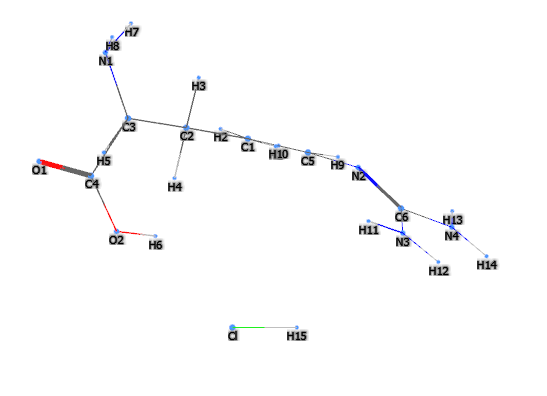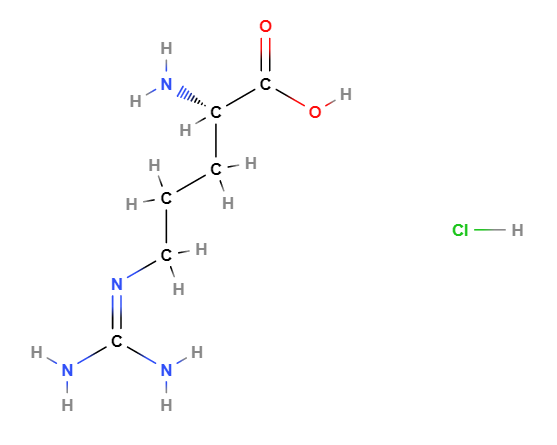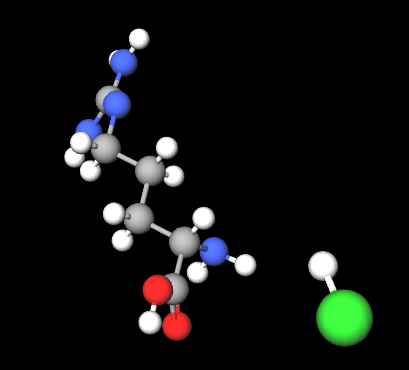Check the ingredients!
... live healthy!


| "Descrizione" by Ark90 (12417 pt) | 2022-Dec-05 08:49 |
Arginine HCl is the hydrochloride salt form of arginine. L-arginine is the L-isomer of arginine.
It is an alpha-amino acid, one of the 8 essential amino acids in the human body. It is involved in protein synthesis and helps hormones maintain a healthy body and skin, and is involved in biological processes of the immune, cardiovascular and growth systems.
Synthesised, it appears as a white crystalline powder that is easily soluble in water, slightly soluble in ethanol, insoluble in ether, darkens in colour at 230°C, disintegrates at 244°C.

What it is used for and where
Amino acids play a key metabolic function in the human body and are constituents of proteins.
As food additives they perform different functions: preservatives, flavour enhancers, food supplements and more.
Amino acids together with their salts are used in cosmetics as conditioning agents for both hair and skin (e.g. as moisturisers and other similar functions). Moisturisers are different in nature: the best are the natural ones that exploit the mechanism of integration between the ingredient and the skin by moisturising the horny hydrolipid film, i.e. the thin protective layer that covers the epidermis protecting it from harmful external microbes, keeping the skin moisturised and supple and its pH or acidity value between 4 and 6. Then there are the occlusive moisturisers, usually derived from petroleum (Paraffinum, Paraffinum liquidum and others), but also triglycerides, lanolin oil, natural or synthetic waxes, fatty acid esters and others that create an artificial occlusive layer on the stratum corneum of the skin with the advantage of accelerating the protective process but with the disadvantage of preventing the skin's natural transpiration.
α-amino acids that have similar physical structures undergo similar changes with regard to solubility in water/ethanol mixtures, and technologies to separate α-amino acids from industrial residues, which may not even be innocuous, are constantly being improved. However, many data on the solubility in water-ethanol and ethanol of some α-amino acids are contradictory or even lacking, and the effects of ethanol on the solubility of amino acids may be different. Overall, the scientific literature considers that α-amino acids do not pose significant problems for human health when taken orally, except in people with certain genetic diseases.
Food safety: amino acid α generally considered safe.
Cosmetic safety: amino acid α generally considered safe when formulated to be non-irritant.
Medical
In ageing, growth hormones tend to work less and this results in less flexible and thinner skin. One remedy is injections of appropriate hormones, but this method is obviously quite different from what nature intended. An alternative and more natural remedy is to take a 'releaser', i.e. a component that has the function of stimulating the growth hormone: Arginine.
As far as the cardiovascular system is concerned, this study highlights recent advances in the biological and clinical role of arginine, concluding that arginine could exert cardioprotective effects (1), and other studies point to its role in restoring endothelial function in atherosclerotic patients, in whom there are high levels of asymmetric dimethylarginine, so the results confirm L-arginine as a potential therapy for cardiovascular disorders (2). Its use in septic and critical hospital patients has been controversial although the use of arginine has been shown to help a variety of critically ill patients (3).
In dental care, many studies have focused on the efficacy of arginine in dental care products (toothpastes, mouthwashes) in preventing the development of new caries and the progression of existing caries, but conclusions are mixed. Some believe that there is currently insufficient evidence to support a caries-preventive effect for the inclusion of arginine in these products (4), while other studies believe, albeit with very few well-conducted randomised controlled trials, that 1.5 per cent arginine and 1,450 ppm fluoride is effective in inactivating radical caries lesions (5).
Arginine has proven to be of great help in wound healing and skin repair. Shockwave therapy or oral L-arginine therapy improved erectile dysfunction (6).
Cosmetics
Studies on arginine in the medical sector concerning its use as a tissue regenerator have led personal care cosmetics companies to include arginine in many creams and various preparations with the function of tissue regeneration, rejuvenation, elasticity and skin defence (7).
Safety
Arginine is generally considered to be a safe component in the scientific literature, however this recent study by researchers at the University of São Paulo, Brazil warns of the effects that may affect blood pressure and others caused by antiseptic mouthwashes containing chlorhexidine against L-arginine supplementation (8).
The most relevant studies on this hydrochloride salt have been selected with a summary of their contents:
Typical commercial product characteristics L-arginine hydrochloride
| Appearance | White powder |
| pH | 10.5~12.0 |
| Boiling Point | 409.1ºC at 760 mmHg |
| Melting Point | 226-230°C(lit.) |
| Flash Point | 201.2ºC |
| PSA | 125.22000 |
| LogP | 1.35480 |
| Loss on drying | ≤0.5% |
| Residue on ignition | ≤0.1% |
| Chloride | ≤0.02% |
| Sulfate | ≤0.02% |
| Other amino acids | ≤0.4% |
| Ammonium | ≤0.02% |
| Arsenic | ≤1ppm |
| Iron | ≤10ppm |
| Heavy metals | ≤10ppm |
| Chemical Risk |  |
 |  |
 |  |
Price
100 g $72.80
1 kg $550.00
Synonyms:
References________________________________________________________________
(1) Mangoni AA, Rodionov RN, McEvoy M, Zinellu A, Carru C, Sotgia S. New horizons in arginine metabolism, ageing and chronic disease states. Age Ageing. 2019 Nov 1;48(6):776-782. doi: 10.1093/ageing/afz083.
(2) Gornik HL, Creager MA. Arginine and endothelial and vascular health. J Nutr. 2004 Oct;134(10 Suppl):2880S-2887S; discussion 2895S. doi: 10.1093/jn/134.10.2880S.
(3) Rosenthal MD, Carrott PW, Patel J, Kiraly L, Martindale RG. Parenteral or Enteral Arginine Supplementation Safety and Efficacy. J Nutr. 2016 Dec;146(12):2594S-2600S. doi: 10.3945/jn.115.228544.
(4) Ástvaldsdóttir Á, Naimi-Akbar A, Davidson T, Brolund A, Lintamo L, Attergren Granath A, Tranæus S, Östlund P. Arginine and Caries Prevention: A Systematic Review. Caries Res. 2016;50(4):383-93. doi: 10.1159/000446249.
(5) Wierichs RJ, Meyer-Lueckel H. Systematic review on noninvasive treatment of root caries lesions. J Dent Res. 2015 Feb;94(2):261-71. doi: 10.1177/0022034514557330.
(6) Gallo L, Pecoraro S, Sarnacchiaro P. Adjuvant daily therapy with L-arginine 2,500 mg and tadalafil 5 mg increases efficacy and duration of benefits of low-intensity extracorporeal shock wave therapy for erectile dysfunction: A prospective, randomized, single-blinded study with 1-year follow-up. Investig Clin Urol. 2022 Jan;63(1):83-91. doi: 10.4111/icu.20210317.
(7) Kocic H, Arsic I, Stankovic M, Tiodorovic D, Ciric V, Kocic G. Proliferative, anti-apoptotic and immune-enhancing effects of L-arginine in culture of skin fibroblasts. J Biol Regul Homeost Agents. 2017 Jul-Sep;31(3):667-672.
(8) Batista RIM, Nogueira RC, Ferreira GC, Oliveira-Paula GH, Damacena-Angelis C, Pinheiro LC, Tanus-Santos JE. Antiseptic mouthwash inhibits antihypertensive and vascular protective effects of L-arginine. Eur J Pharmacol. 2021 Sep 15;907:174314. doi: 10.1016/j.ejphar.2021.174314.
| Evaluate |